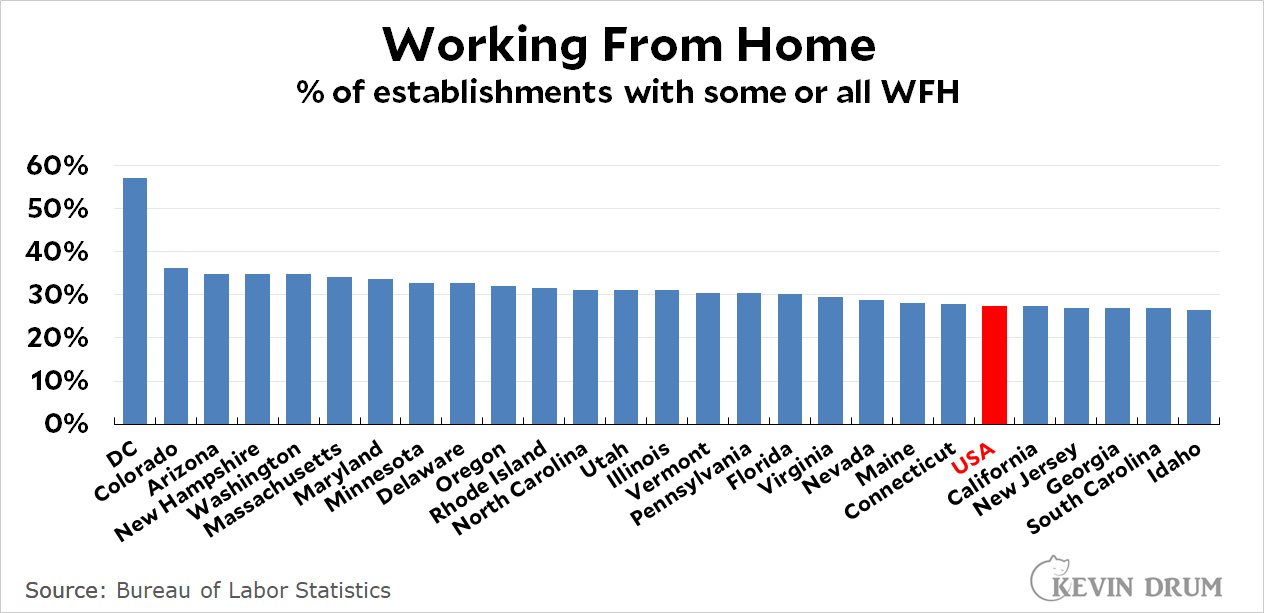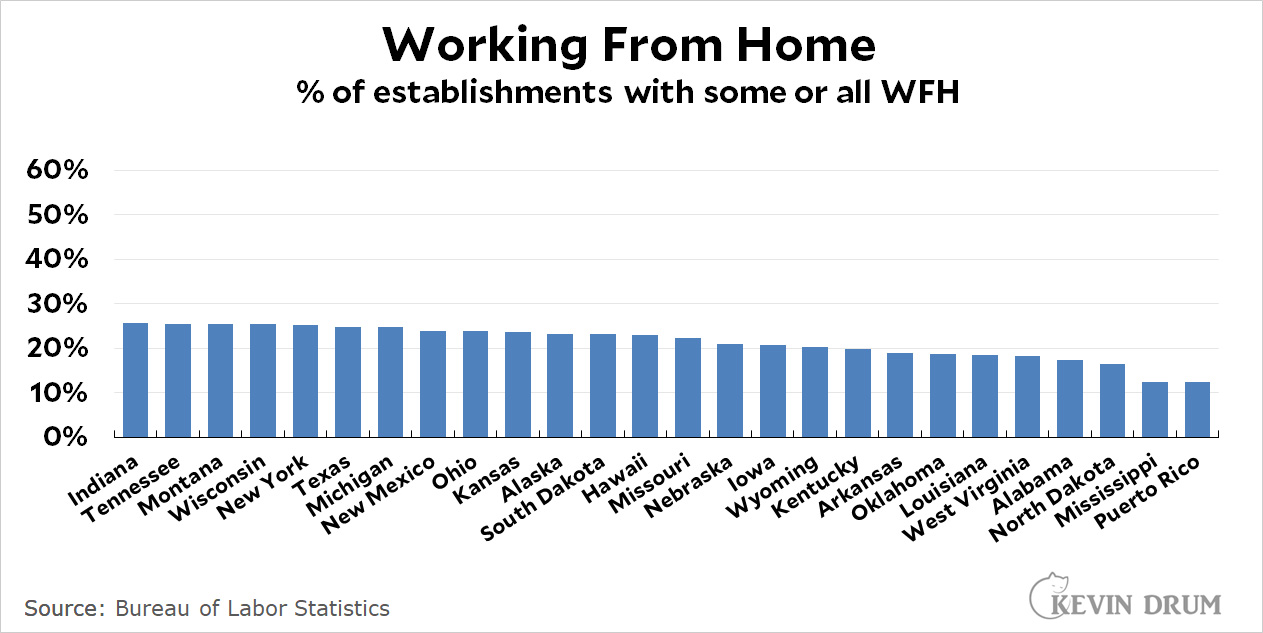Which state has the most employers who allow employees to work from home at least part of the time? California isn't even close to the top:

 The winner is Washington DC! And this is strictly a survey of private businesses, so this has nothing to do with government workers. DC just has a lot of businesses that allow workers to work from home. California ranks 23rd, right at the national average.
The winner is Washington DC! And this is strictly a survey of private businesses, so this has nothing to do with government workers. DC just has a lot of businesses that allow workers to work from home. California ranks 23rd, right at the national average.
By the way, this survey suggests that WFH was way down last year. The percent of establishments with any WFH was 27.5% in 2022, compared to 39.8% in 2021. That's a big drop.
As of September 2022, when the survey was conducted, the number of workplaces with any WFH was up only four percentage points from before the pandemic (27.5% vs. 23.3%). This suggests that WFH is already almost back to its pre-pandemic normal.

I would think the mix of businesses would change this. Not many agricultural or service-worker jobs done from home, for instance.
Google paid 99 dollars an hour on the internet. Everything I did was basic Οnline w0rk from comfort at hΟme for 5-7 hours per day that I g0t from this office I f0und over the web and they paid me 100 dollars each hour. For more details
visit this article... https://createmaxwealth.blogspot.com
Yes, but in what State were you?
😉
The majority of agriculture is work from home.
I hope, for some people, there's a better work balance and a bit less commuting.
But for people who couldn't work from home during the pandemic, it's gotten worse due to a lack of co-workers and day care.
This liberal strongly feels we should disconnect health care and work.
And we should connect workplaces and and daycare.
Are these company locations or worker locations?
Because I live in Maine, and there are a lot of new people who have moved into the state but work far away. Family member works for Google in Cambridge but lives here; my sweetie taught in Boston for a while.
And this is a rural place, so it only takes a few people to seem like a lot; I realize. But the unintended consequence, combined with short-term rentals, is a difficult housing shortage.
It would be interesting to see wfh as a percentage of workers. Google and Apple are a much larger fraction of the workforce than they are a fraction of the businesses.
The graph loosely correlates with urbanization: https://en.wikipedia.org/wiki/Urbanization_in_the_United_States
"The winner is Washington DC! And this is strictly a survey of private businesses, so this has nothing to do with government workers. DC just has a lot of businesses that allow workers to work from home."
Obviously big cities, especially on the coasts will have a much higher rate than states. Here are a few cities where companies are offering work from home for new hires:
San Francisco 29%
D.C. 27%
Boston 24%
Chicago 22%
Atlanta 21%
U.S. 10%
The D.C. ranking doesn't really have nothing to do with government employment, even if the survey is only of private businesses. The federal government is such a key employer in the D.C. area that other organizations and businesses tends to offer pay and benefits closer to what the federal government offers than they would elsewhere.
I would think “any WFH” might skew the trend line. Some business allowing 80-100% telework would mean more telework hours in total, even if other businesses allowing minimal telework cut back. Is there a way to compare total WFH hours per week pre and post- COVID?
My employer offered telework pre-pandemic and then offered 100% telework (and still does). An “any WFH” measure would show us as unchanged but one stop to the ghost town, er, office makes it pretty clear that’s not the case
DC doesn’t really produce any products. There’s no industrial base there. Nobody really makes any physical object in DC, except maybe beer and artworks. Basically all private jobs in DC are (1) restaurants and retail, (2) advocacy groups and consultancies, (3) health care, (4) education and (5) lawyers.
Only (1) and probably (3) requires in-person presence all the time. (2), (4) and (5) can be conducted remotely for long periods of time.
Not a shock that DC has more private employees working from home than other states.
DC of course is #1. A large number of jobs in DC can be done remotely and in the case of government contractors the jobs that can be remote are allowed to be as the government doesn't want to waste $$ renting office space for contractors directly or indirectly.
I don't think the genie will be put back in the bottle, too much cost savings by allowing appropriate jobs to be done remotely. But in DC the GOP will attempt to force the genie back into the bottle should they win control of congress and the White house. It's all about punishing government workers for even existing.
Wish I were still WFH. Unfortunately my boss left ( fired) and replaced by a tool bag who is pro office. On the bright side I’m in a regional office and his attempt to get us back into NYC flopped. So I have a 20 minute commute rather then and hour on Rail Road time ( which is scheduled for an hour all in but could be 1 and half). Don’t miss that at all!
Looks like it’s mostly a graph of “knowledge workers” as a % of total workers. And jobs in urban areas as % of total jobs.
About 90% of the workers I know personally work remotely.**
**a completely skewed sample consisting totally of software engineers living in the Bay Area, or living elsewhere but working at Bay Area companies. Representing about 7 or 8 companies.
Mr. Drum seems skeptical of remote work - I was too initially. A decade ago I thought people WFH were mostly screwing off. Air quotes “working” from home. Having sex, sleeping late, eating, drinking, smoking, exercising, chores, errands, walking their dog, watching their kid. (I used to envy people who could WFH a few days a week).
Slacking off of course happens, but some small % work more, some large % work less, some used to screw off all day in the office, now do so at home. We muddle through. (I think employee monitoring conventions will increase probably, which will be good because more will get to work from home).
The industry has SO much money sloshing around it, that it can carry 30% of employees (making ~200k each) working at 50% effort. I’ve personally known about 3 guys who seem to work the equivalent of 1 hour a day.
Until the post-work economy makes everything free, this could be a way to steal one’s time back. Not sure I can fault them. They’re kind of winning. It’s also dishonest. So I’m not sure.
It's not just the software industry, it's honestly most of the economy. Basically any industry that relies on so-called knowledge workers has a lot of slack in it. I'm sure others, too.
My NYC office went back to a soft mandatory three days a week - Tues-Thurs - for senior leaders like me last October with the rest of staff on board from Feb 1st Most are doing so, but about a month ago I switched to coming in every day unless I have to write a big presentation - we're all open plan, hot desk and you really need quiet and focus for that.
Two reasons. One, I like working with my colleagues and yes, you can things done faster when people are in the same place. And personally I really found WFH-Office-Office-Office-WFH routine disrupting. For my sanity is was either Office with occasional WFH or visa versa. Now I'm almost 58, and I will say it does seem my younger colleagues prefer to WFH.
"As of September 2022, when the survey was conducted, the number of workplaces with any WFH was up only four percentage points from before the pandemic (27.5% vs. 23.3%). This suggests that WFH is already almost back to its pre-pandemic normal."
FFS, no it doesn't.
WFH is far more widespread than it used to be. My organization was always "has any WFH", but it was only on an as-needed basis. So many organizations that used to just allow it here and there now have either full time WFH or partial, with regularly scheduled days.
That's a HUGE difference.
This is my experience as well. My background is oil/gas/power infrastructure and for many years prior to the pandemic, almost every company I interacted with had a WFH policy, but very few people spent any actual time WFH.
By 2022, almost every company in my circle had a hybrid setup where everyone had to be in the office 1 to 4 days a week.
Looking at a survey this could be interpreted as a reversion to pre pandemic trends, but on the ground it certainly looks like a dramatic change for a stodgy, old school part of the economy. Although certainly a reversion from the peak of thr pandemic, this is definitely not a reversion to pre pandemic trends. At least not in my anecdotal experience. I would imagine the office work industries look very different than the retail and service industries.
Kevin seems committed to a narrative.
Kevin misses the point that WFH will be looked at more closely in the near future
We are seeing the beginnings of labor shortages in just about all industries. There are some that can WFH others cannot. For those that CAN WFH the employers will begin to see this as a tool to attract workers. So long as the workers produce then this is a no brainer for them it costs next to nothing. Make it so it can be started one year after starting the job.
SKorea is extending their already oppressive workweek
France has INCREASED the retirement age
China is struggling with its birthrate as are wee
We cannot meet recruiting targets in the mililtaty and other "careers"
All because of negative or near negative birthrates
WFH will become a necessary benefit to attract those wrkers who feel they would benefit from it
I guess my question is how much work "some" is doing in "all or some WFH" in those charts. I think 100% WFH is going to be pretty rare going forward. Most companies -- at least those relying largely on knowledge workers -- will land somewhere in the middle with a kind of flex regimen that will let people choose to, say, work 1 day a week from home, or something. I agree with what others have said that this will probably become another benefit or perk that companies use to compete for talent -- not a bad thing.
Shouldn't the real correlation be between work from home state and high income and not work from home, i.e. republican and extreme poverty.